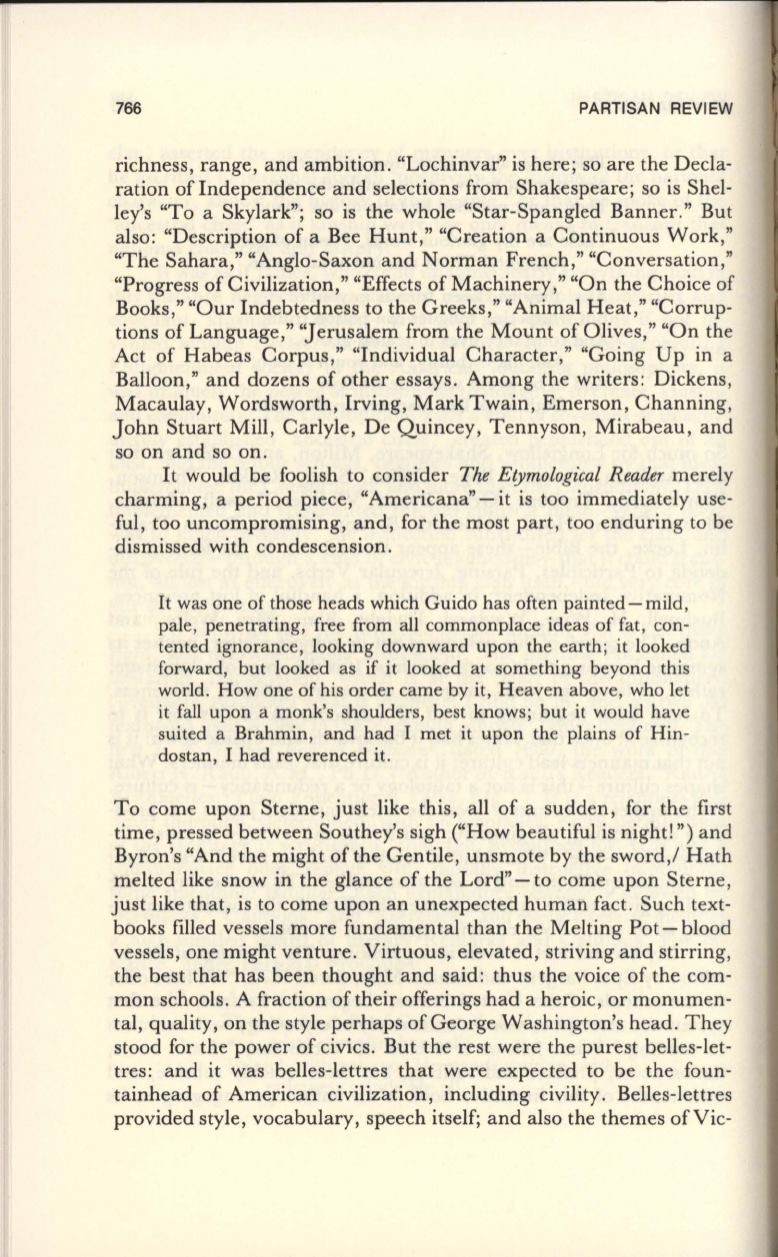
766
PARTISAN REVIEW
richness, range, and ambition. "Lochinvar" is here; so are the Decla–
ration of Independence and selections from Shakespeare; so is Shel–
ley's "To a Skylark"; so is the whole "Star-Spangled Banner. " But
also: "Description of a Bee Hunt," "Creation a Continuous Work,"
"The Sahara," "Anglo-Saxon and Norman French," "Conversation ,"
"Progress of Civilization," "Effects of Machinery," "On the Choice of
Books," "Our Indebtedness to the Greeks," "Animal Heat," "Corrup–
tions of Language," 'jerusalem from the Mount of Olives," "On the
Act of Habeas Corpus," "Individual Character," "Going Up in a
Balloon," and dozens of other essays . Among the writers: Dickens,
Macaulay, Wordsworth, Irving, Mark Twain, Emerson, Channing,
John Stuart Mill, Carlyle, De Quincey, Tennyson, Mirabeau, and
so on and so on.
It
would be foolish to consider
The Etymological Reader
merely
charming, a period piece, "Americana"-it is too immediately use–
ful, too uncompromising, and, for the most part, too enduring to be
dismissed with condescension .
It was one of those heads which Guido has often painted- mild ,
pale , penetrating, free from all commonplace ideas of fat , con–
tented ignorance, looking downward upon the earth; it looked
forward, but looked as if it looked at something beyond this
world. How one of his order came by it, Heaven above, who let
it fall upon a monk's shoulders, best knows; but it would have
suited a Brahmin, and had I met it upon the plains of Hin–
dostan , I had reverenced it.
To come upon Sterne, just like this, all of a sudden, for the first
time, pressed between Southey's sigh ("How beautiful is night!") and
Byron's "And the might of the Gentile, unsmote by the sword,/ Hath
melted like snow in the glance of the Lord"- to come upon Sterne,
just like that, is to come upon an unexpected human fact. Such text–
books filled vessels more fundamental than the Melting Pot- blood
vessels, one might venture. Virtuous, elevated, striving and stirring,
the best that has been thought and said: thus the voice of the com–
mon schools. A fraction of their offerings had a heroic, or monumen–
tal, quality, on the style perhaps of George Washington's head . They
stood for the power of civics. But the rest were the purest belles-let–
tres: and it was belles-lettres that were expected to be the foun–
tainhead of American civilization, including civility. Belles-lettres
provided style, vocabulary, speech itself; and also the themes of Vic-


